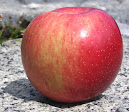 |
Well of course they do, but at what scale, and which kinds do they like?
On a recent October visit, I saw Cox's Orange Pippin and a russet variety on supermarket shelves next to the more familiar (to Americans) Pink Lady and Braeburn.
The selection was rather smaller than one might find at a similar market here in New England.
But October is the great harvest month of the year, so who needs supermarkets? I looked forward to what I might find at street markets in the great city of London.
I was disappointed.
Not by London, but the greenmarkets might as well have been apple-free zones.
Market failure
Hardly a total loss, since the same vendor sold me my Kissabel. But where were the farmers with their heritage fruit?
Not at the vast Portobello Road market, where I found many marvelous things, but only one box of russet apples in the whole enormous place.
 |
| Paella, like many other things that are not apples, was abundant at London's Portobello Road market in October. |
Here in the States, cities attract farmers selling fresh produce. Great cities draw fresh apples from miles away. The Union Square greenmarket in New York City is a marvel in October.
Even in my much smaller town, in a poor harvest, the farmers market offered a choice of 17 varieties in late October.
So, where do Londoners get their apples? And what kind do they eat if they do?
British apples
First of all, British apples, one or other variety of which is obtainable for about seven months of the year. Nearly all British fruits and vegetables have a good natural flavour, but the apples are outstanding.
That's what I'm talking about.

Hello, saw you on Twitter/X!
ReplyDeleteLondon moves fast and is expensive. It's impossible to sell farm apples at any kind of profit at London markets or events. Imported supermarket apples are the norm. The UK has lost 80% of it's orchards, so you'd have needed to go out to the counties to find heritage apples. Brogdale, the orchard that's the national fruit collection would have been about 2 hours travel a way. The heritage orchards in Essex roughly the same, and would have includes Tolleshunt D'arcy of D'Arcy Spice fame.
Thanks for the explainer! Still hard to get my head around.
DeleteFor so much of my time in London it was "where are they? Got to be around here someplace."
I did make it out to Kent at one point, report to follow.
In September I had some good Pink Lady apples I got at Waitrose in Dorchester. They were smaller than what I can get in Atlanta but with a better flavor and texture. I was in Dorchester for nearly two weeks. There was a farmers market on Saturdays but due to the seminar I was attending I couldn’t get to it to see what they had. Now I wish I had tried harder to make time. I should have an opportunity next September. Will try then. In general I wasn’t seeing as much produce when I could get to the supermarket. I’d understood there were shortages of various produce in part due to weather conditions in Spain that had reduced crop sizes.
ReplyDeleteHi Adam it's Karim, I can't defend London. I imagine the main 2 issues are that we don't have anyone growing unusual varieties in any decent quantity to sell at these markets and it's likely very few people in London would appreciate a larger range of apples, it's probably not a London thing.
ReplyDeleteHi Karim, it's nice to hear from you! You might be interested in OrchardThing's comment below, about some of the subsidies and other factors shaping apple markets.
DeleteHere in New England, it is certainly helpful that there are many orchards within 50 miles of the cities. Farmers do not have to travel far to bring their produce to urbanites who are very willing to buy.
Even if most Londoners wouldn't care for that (and I have no opinion about that), all you'd need would be enough.
In a city of 9 million, if only one in a hundred appreciate apples beyond the supermarket monoculture, that is still a market of 90 thousand potential buyers.
The markets and regulations are stacked against domestic production. As you noticed, even in the supermarkets there are few UK-grown apples. Domestic production costs are outcompeted by imported fruit - by land prices and wages, and the standards that our farmers are held to aren't imposed on growers of imported fruit. As mentioned above, you can sometimes find heritage varieties in rural locations and farmgate sales but sadly it's very hit and miss.
ReplyDeleteMost of the supermarket apples where I live grow in Washington, about 3000 miles away. But we also see a few regional favorites like McIntosh, especially in the fall.
DeleteProbably some New England orchards feed into whatever distribution system bring the Macs (and Cortlands and Macouns) to market. U-pick is very big here.
Some growers have a personal interest in heritage apples, kind of as a sideline for the Honeycrisps, Galas, and Macs that are most popular. One orchard had two Cox trees (they have more now!), another grower got into Ashmead's Kernel and had quite a crop this year, and so forth. These experiments feed niche eaters like me!
I can think of two orchards that specialize in the older varieties. They have made a business of it, selling to restaurants and boutique groceries.
So the facts on the ground are a little different but the basic story is the same, a huge wholesale market, increasingly global, drives a few largely similar varieties. Neither consumers nor growers are to blame, but I would say the system is rigged.